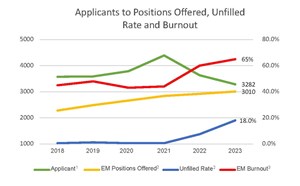ACEP advocacy has been especially busy over the last few weeks.
Our chapters have earned multiple hard-fought successes for ED security, mental health care, and physician leadership. In Washington, D.C., ACEP is standing up for you and your patients by continuing to educate Congress about the dangers of boarding.
Among colleagues, ACEP is the emergency medicine organization recognized with voting seats at the American Medical Association (AMA) House of Delegates. At this year’s annual meeting, ACEP leaders represented the specialty and deliberated with colleagues on issues of importance to our patients and our profession.
Standing up for EM and protecting our patients
ACEP helped ensure passage of a policy directing the AMA to advocate for legislation or regulations that ensure only physicians supervise emergency care in an emergency department.
ACEP also called on the AMA to expand a proposed resolution to encourage hospitals to minimize sleep interruptions for inpatients to include all patients, such as those boarding in the ED—it ultimately passed with ACEP suggested amended language. ACEP also supported a policy that naloxone should be more accessible to teachers, staff, and students in schools.
Prioritizing vital funds for emergency care
An adopted resolution developed and introduced by ACEP calls for the AMA to recognize EMS as an essential service of government and directs the development of model state legislation.
Supporting your health
ACEP backed important mental health provisions under discussion, including resolutions that only relevant mental health information should be used in licensing and credentialing of physicians; resident physicians should automatically get mental health screenings unless they opt out; and that physicians themselves should have access to mental health, substance-use awareness, and suicide-prevention screening programs.
Facilitating data and innovation
ACEP supported an amended resolution to reduce pricing and expand access to Centers for Medicare and Medicaid Services (CMS) clinical data registries.
Advocating for a ban on non-compete clauses in employment contracts
ACEP helped craft and strongly support policy directing the AMA to advocate for a ban on non-compete clauses in hospital and staffing company contracts and support the development of an AMA-funded study to provide recommendations on how a ban could impact independent physician groups. This is a significant change in AMA’s position that is already gaining media attention.
Fighting the growing risks and toll of corporatization
ACEP President-Elect Aisha Terry, MD, MPH, FACEP was featured on a distinguished panel discussion about the impact of private equity. She spoke passionately about the challenges many of us face on the job and outlined the ways ACEP fights to restore physician autonomy and career fulfillment and reduce threats from the increasing corporatization of medicine.
Federal Advocacy on Boarding
On June 21, ACEP led a Congressional briefing to express grave concerns to Congress about the impact of patient boarding on our health care safety net.
Joining ACEP in front of a packed room of Congressional staff were Dustin Bass, RN, CEN, NEA-BC, Emergency Nurses Association board of directors, and Susan Stearns, executive director of the New Hampshire chapter of the National Alliance on Mental Illness (NAMI).
The briefing received major media attention and ACEP advocacy continues to create opportunities for emergency physicians to speak out. ACEP is voicing support for mental health legislation and numerous policy solutions that address many of the causes and consequences of boarding.
As I recounted to Congressional staff;
“Emergency department patient boarding has brought the nation’s safety net and the physician and nurse workforce to the brink of collapse. Even as we try our best to deliver care in distressing and sometimes punishing circumstances, the situation is not fully under our control.
It’s not just the system, it’s the people who are now distressed. And, it’s not just an emergency department problem, it’s a health care system problem.
Patient boarding is ubiquitous, prevalent, and we have reached a crisis point—boarding is a clear and present danger for communities and public health.”
The briefing concluded on a hopeful and encouraging note as those present were reminded that there are immediate steps that we all can take if we have the courage to step forward.
ACEP is ready and willing to lead the way.





